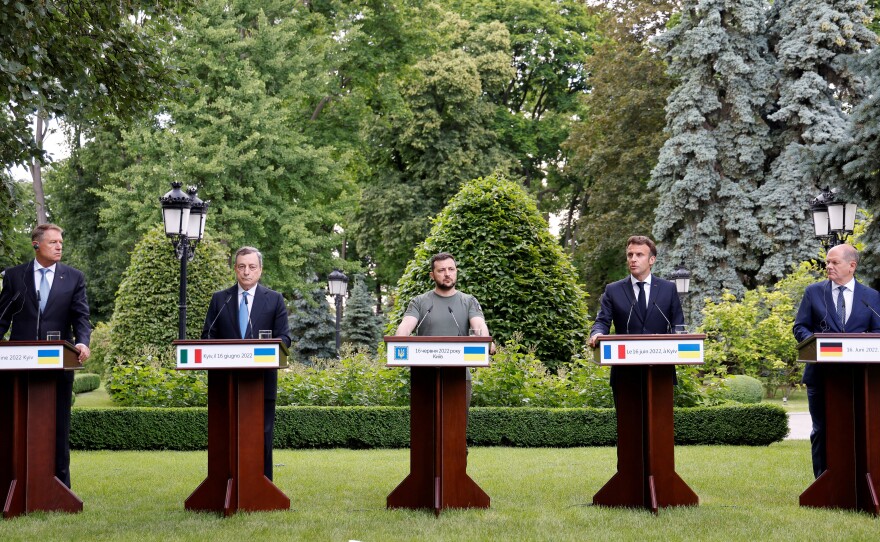As Thursday draws to a close in Kyiv and in Moscow, here are the key developments of the day:
The leaders of France, Germany, Italy and Romania met with Ukrainian President Volodymyr Zelenskyy in Kyiv, showing support for Ukraine in fending off the Russian invasion and for its path toward European Union membership. Zelenskyy had accused France, Germany and Italy of not doing enough to help defend his country. Among new promised aid packages, French President Emmanuel Macron pledged to send more truck-mounted artillery guns to the country. The EU leaders arrived by train in Kyiv to air raid sirens. They also visited Irpin, northeast of the capital, where Macron said there were signs of massacres.
Russia's central bank head warned that the country's economy is unlikely to bounce back anytime soon to prewar conditions. Russia's economic development minister said the gross domestic product will fall by 7.8% this year, as international sanctions and business pullouts take a toll.
NATO allies want to beef up deterrence along its eastern flank so Russia doesn't plan further aggression in the region. Meeting with member countries' defense chiefs in Brussels, NATO Secretary-General Jens Stoltenberg called for more air, sea and cyber defenses, plus prepositioned equipment and weapons. U.S. Defense Secretary Lloyd Austin said the U.S. and its allies would place more equipment in Eastern Europe and put troops on higher alert. Baltic countries urged for more troops to be stationed there, too.
The U.S. State Department said it's in touch with families of three U.S. citizens reported missing in Ukraine. This could be the first time Americans have been captured by Russian forces during the war. Earlier, a court in a Russian-controlled region of Ukraine charged two captured British fighters and one Moroccan man as mercenaries and sentenced them to death. They were among the thousands of foreigners who have joined the fight in Ukraine. The State Department has encouraged Americans not to travel to the country.
In a new round of sanctions, the United Kingdom targeted the head of the Russian Orthodox Church, Patriarch Kirill, for supporting the war in Ukraine. British Foreign Secretary Liz Truss said Kirill "repeatedly abused his position to justify the war." The new sanctions also include Russia's children's rights commissioner, Maria Lvova-Belova "for her alleged involvement in the forced transfer and adoption of Ukrainian children." She is accused of facilitating the forced adoption of 2,000 Ukrainian children sent to Russia.
In-depth
Ukraine finds itself outnumbered as Russia advances in the Donbas.
Ikea packs up Russian operations and plans sale of factories.
As Russia pushes deeper into eastern Ukraine, some flee on medical evacuation train.
Special report
Russia's war in Ukraine is changing the world: See its ripple effects in all corners of the globe.
Earlier developments
You can read more daily recaps here. For context and more in-depth stories, you can find more of NPR's coverage here. Also, listen and subscribe to NPR's State of Ukraine podcast for updates throughout the day.
Copyright 2022 NPR. To see more, visit https://www.npr.org. 9(MDAzMjM2NDYzMDEyMzc1Njk5NjAxNzY3OQ001))
Loading...






